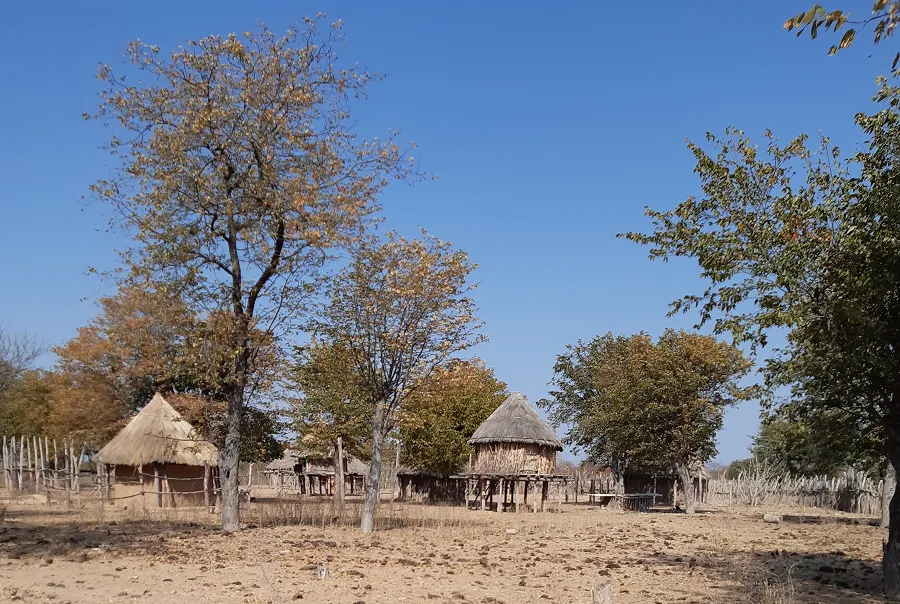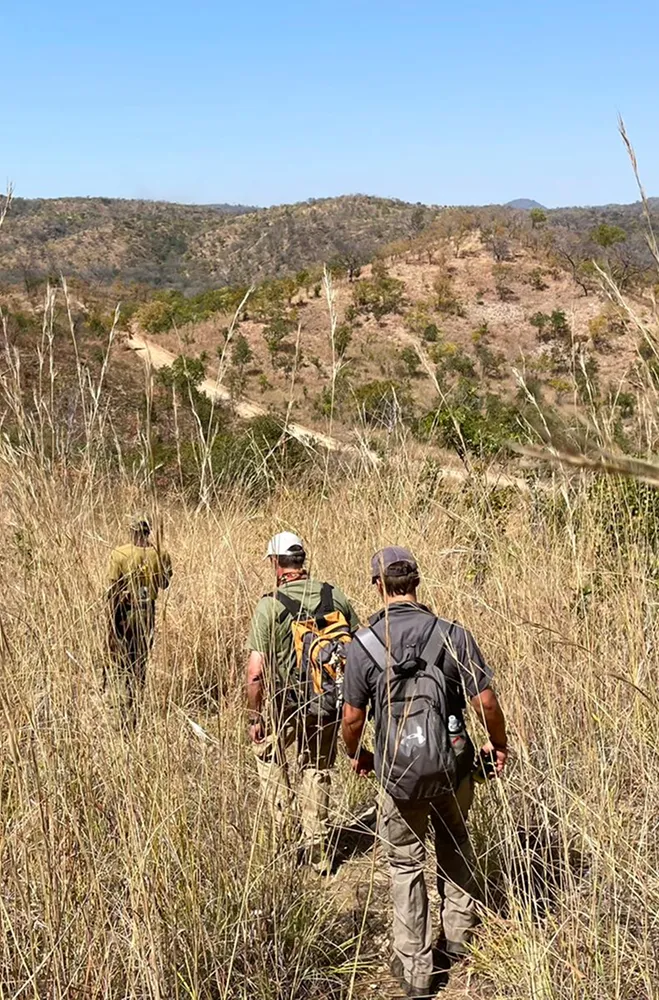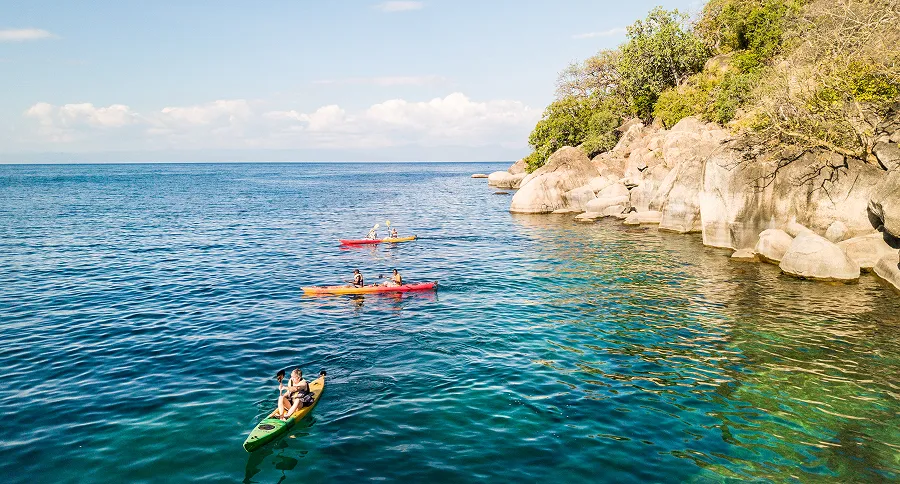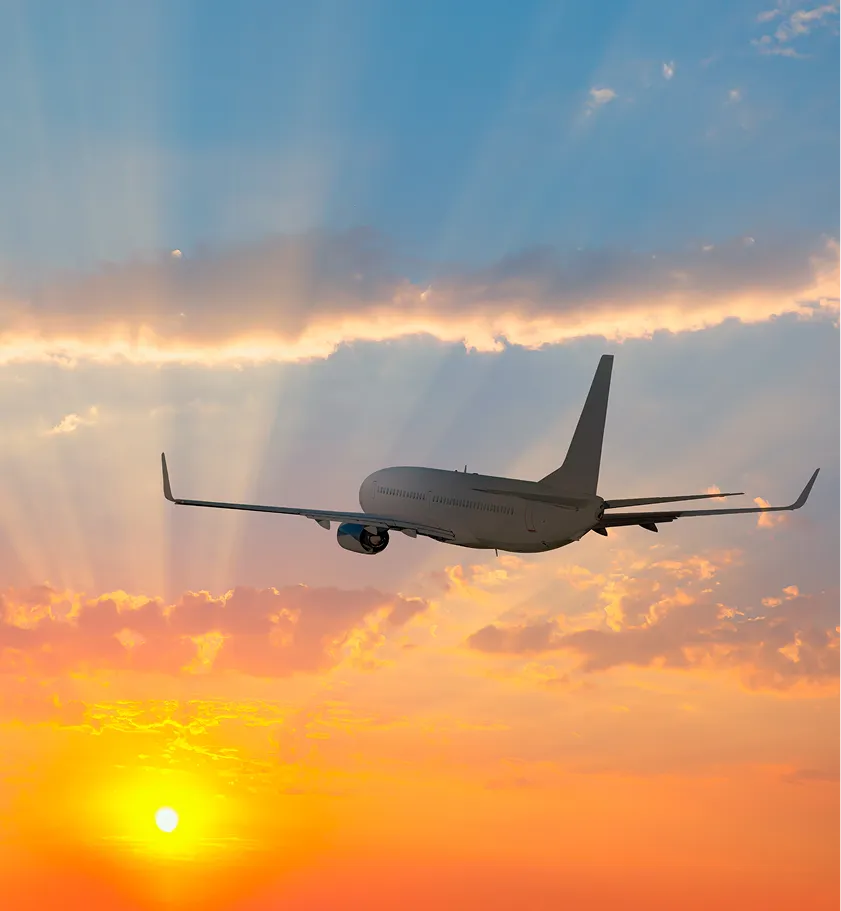Our Programmes
gap year
Gap Year Adventure
This is a comprehensive eight week programme for young people, based at Lake Kariba, Zimbabwe and in Malawi, “The Warm Heart of Africa”. Designed for a group of no more than 16 people the itinerary blends cultural immersion, conservation, hands-on projects, adventure, and personal development.
Instructions
To make this component work with other components you must:
- Add a background color to the section div above ↑ this Timeline section. This is will help hide the progress line overflow.
- Add z-index-2 class to the section div above ↑ this Timeline section. This will ensure the oveflowing progress line from the Timeline section below ↓ is hidden underneath it.

Week 1
Discover Kariba – Culture, Community & Connection
Step off the plane and into the beating heart of Africa. Your adventure begins in Harare, where you’ll spend the night and meet your tribe of fellow explorers before heading on a scenic road trip the next day through rugged bushlands and rural Zimbabwe. Arrive at Warthogs Safari Camp, nestled on the shimmering shores of Lake Kariba - Africa’s largest man-made lake - surrounded by wildlife and the distant roar of lions at dusk. This is your chance to live the real African experience. From tracking animals through the bush to hooking the famous tiger fish, you’ll be surrounded by nature in its rawest, most beautiful form.
Expect daily encounters with elephant, buffalo, zebra, crocodiles and hippos, while the cry of the African fish eagle becomes your daily soundtrack.
Orientation & Cultural Immersion
After an extensive safety briefing, you will explore the dramatic Kariba Dam Wall, hear all about Nyami Nyami, the River God, and meet the people who call this region home. Learn bush survival basics, making stretchers for emergencies, and how to handle the challenges of remote living.
First Aid & Rural Exposure
Gain vital wilderness first aid skills. Visit a rural village school and see firsthand the realities of life in the bush – and the strength of the communities within it.
Practical Skills
Learn how to weld, make bricks, cook, make biltong and many other practical skills. You will never know when you might need them. Get hands-on with meaningful development work: from building cultural villages, through glitterstone mining to supporting wildlife protection efforts
Week 2
Build, Create & Make a Difference
Week two is all about rolling up your sleeves and making a real difference. You’ll be involved in powerful hands-on projects focused on conservation, sustainability, and cultural heritage. This week is all about impact - giving back, learning new skills, and bonding through shared purpose.
Community Projects Rotation
Tackle powerful conservation and community projects. From constructing dam walls to crafting eco-bricks, every action makes a difference.
Projects You’ll Dive Into
Cultural village constructionTree planting & elephant protectionWildlife rehabilitationPlastic recycling & eco-buildingGame-viewing platform building
- Cultural village construction
- Tree planting & elephant protection
- Wildlife rehabilitation
- Plastic recycling & eco-building
- Game-viewing platform building
Skills & Teamwork
Learn how to work as a unit, communicate under pressure and develop practical abilities that stay with you for life.
Rest Day Celebration
Take a breather and soak in Kariba’s thrill factor - paintballing, quad biking, playing football and having a classic African braai on the floodplains, as elephants roam nearby.


Weeks 3 & 4
Into the Wild – Community Participation, Conservation and Raw Camping
Time to unplug. Over the next two weeks, you'll step fully into nature with rotating adventure expeditions. Split into two groups - “Nyati” (Buffalo) and “Shumba” (Lion) - switching between community human/wildlife mitigation work and deep bush training.
After four days the groups will swap around, with “Nyati” taking on the community participation and “Shumba” learning the conservation and survival techniques.
Group “Nyati”: Raw bush camping in the Gache Gache and Matusadona areas
Learn survival techniques, cook over open fires, track animals and identify medicinal plants. Real Africa. No filters.
Group “Shumba”: Community Participation
Working with the local communities on projects to mitigate human/wildlife conflict. Whether it’s constructing fences and bomas for livestock, erecting beehives, or making vegetable gardens animal proof, your work will help keep both the communities and the animals safer.
MALAWI
Week 5 & 6
Conservation & Community at Dzalanyama Forest ReserveDzalanyama Forest Reserve
Arriving in Lilongwe, Malawi’s capital city, you will be transported to Dzalanyama Forest Reserve, which is located just two hours away, nestled in ancient woodland.
Overview
Begin your Malawi adventure with two weeks immersed in sustainable conservation, community development, and unspoiled wilderness. Dzalanyama offers rich biodiversity, crystal-clear streams, and a deeply connected local culture. Settle into your pre-made camp, near the river and waterfall.
Highlights
Trail clearing and erosion prevention
Tree planting and seedling nursery work
Bird monitoring and mammal tracking
Sustainable woodlot development to reduce deforestation
Help in local schools or assist with school refurbishment
Work with women’s groups and youth clubs on livelihood projects
Further first aid training
Help with eco-brick construction, permaculture gardening, and more
Learn how to harvest honey
Forest hikes to secret waterfalls and granite outcrops
Evenings around the fire sharing stories with local guides and other volunteers
Birdwatching in one of Malawi’s premier birding destinations
Learn how to handle snakes under expert supervision
.jpg)

Week 7
Challenge Yourself on Mount Mulanje Base: Around Mount Mulanje, Southern Malawi
Malawi’s highest peak (3,002m) and a trekker’s paradise, nicknamed "The Island in the Sky."
Overview
Prepare to be awed by rugged granite peaks, plunging waterfalls, and ethereal mist forests. This week is a thrilling physical and mental challenge - perfectly timed after your grounding time at Dzalanyama.
Highlights
Trekking and Orienteering
Multi-day hikes to stunning viewpoints
Camping in mountain huts with panoramic sunrise views
Learn map-reading and compass skills with local guides
Navigate river crossings, jungle paths, and high ridges
Rock Climbing and Rappelling
Introduction to climbing on ancient granite cliffs
Safety and rope techniques taught by experienced instructors
Explore Mulanje’s Hidden Wonders
Swim in ice-cold mountain pools
Storytelling nights under starry skies
Week 8
Watersports & Wind-down at Lake Malawi Base: Thumbi View
The perfect ending: palm-fringed beaches, crystalline waters, and vibrant lake life.
Overview
After the physical rigours of Mount Mulanje, it’s time to unwind on the shores of Lake Malawi, Africa’s third-largest lake and one of its clearest. Dive into vibrant aquatic life and soak up the last week in paradise before heading home.
Highlights
Aquatic Adventures
Snorkelling with colourful cichlids in the UNESCO-listed Lake Malawi National Park
Kayaking to secluded bays and rocky islands
Fishing trips with local fishermen at sunrise
Jet skiing and scuba diving (with beginner courses available)
Relax & Reflect
Hammock time under the trees
Fresh fish barbecues on the beach
Massage sessions and yoga with lake views
Diary writing and storytelling sessions to capture your journey
Final Night Celebration
Lakeside bonfire
Farewell dinner under the stars with local drumming and dancing
Group reflection and "what’s next" circle


Departure
Fly Home Recharged, Inspired & Transformed
After eight incredible, life-changing weeks in Zimbabwe and Malawi, you’ll leave not just with memories, but with a deeper understanding of yourself, the world, and your place in it.
Ready to Start Your adventure?
Enquire NowWhat Makes This Experience Wildly Unforgettable?
👉 Regular wildlife encounters with Africa’s iconic animals
👉 Real-life conservation, leadership & survival skills
👉 Deep cultural immersion and community connection
👉 Raw, unplugged African bush adventure
Find answers to all your burning questions, here.
Which medicines should I bring or have on hand?
Check with your local GP which immunisations you may need to have, or update, for both Zimbabwe and Malawi. e.g. Yellow fever, typhoid, hepatitis A, rabies, and others. Anti-malarial medications are essential - malaria is present across Zimbabwe and Malawi. Bilharzia (schistosomiasis) is a risk near freshwater (lakes, rivers). Recommended medications should be taken as prescribed before and after freshwater exposure. All providers emphasise the importance of comprehensive travel health insurance and carrying a well-stocked first-aid kit.
Which airlines fly from the UK?
To Zimbabwe: Common routes via Emirates (via Dubai), Qatar Airways (via Doha), Ethiopian Airlines (via Addis Ababa) and Kenya Airways (via Nairobi). Connections sometimes go through Johannesburg. From Malawi: Airlines servicing Blantyre or Lilongwe include Kenya Airways, Ethiopian Airlines, KLM and United (via Europe/Africa hubs).
Are there health concerns I should be aware of?
Yes, travellers should be aware of: Malaria risk in many parts of the country—anti-malarial medication is recommended. Yellow fever vaccination is required if you're arriving from a yellow fever zone. Always drink bottled or purified water.
Can I drink the tap water?
It is recommended to drink bottled or filtered water in Zimbabwe.
Are there COVID-19 or travel restrictions?
Regulations change often. Check with your airline and the official Zimbabwean government or health department websites for current travel and health guidelines.
Can I use my mobile phone in Zimbabwe?
Yes, with an international roaming plan, but it can be expensive. Buying a local SIM card (e.g., from Econet or NetOne) is a more affordable option for data and calls.
What should I pack for a trip to Zimbabwe?
Essentials include: Lightweight, neutral-coloured clothing Warm layers for cool mornings and evenings Sun protection (hat, sunscreen) Insect repellent Comfortable walking shoes Binoculars for wildlife viewing
Can I use credit or debit cards in Zimbabwe?
Card acceptance is limited, especially outside cities. Always carry enough cash, especially for smaller establishments or remote areas.
Do I need a visa to enter Zimbabwe?
Yes, most travellers require a visa to enter Zimbabwe. Visas can be obtained at the airport, border post, or online through the eVisa system. Requirements vary depending on your nationality, so check with the Zimbabwean embassy or immigration website beforehand. Travel Documents: Passports should be valid for at least six months from your arrival date
What is the best time to visit Zimbabwe?
The best time to visit is during the dry season, from April to September, especially for wildlife viewing and visiting Victoria Falls when the water levels are moderate and visibility is best.
What currency is used in Zimbabwe?
Zimbabwe uses a multi-currency system. The most commonly accepted currencies are US Dollars (USD) and South African Rand (ZAR). It's advisable to carry small denominations of USD in cash.
Is tipping customary in Zimbabwe?
Yes. Tipping is appreciated but not mandatory. A general guideline is: 10% in restaurants $5–$10 per day for guides $1–$2 per bag for porters
Is there anything else I should know?
Malawi is a friendly, welcoming country. Patience is helpful—things may move at “Africa time.” Take time to engage with locals and enjoy the slow, warm pace of life.
How can I support local communities responsibly?
Buy local crafts and produce. (Do not purchase any wooden made items that may be prohibited on flying out of the country). Support community-led tourism initiatives. Avoid giving sweets or money directly to children; support schools or community projects instead.
What cultural etiquette should I know?
Modest clothing is appreciated, especially in rural areas. Greetings are important; a handshake is customary. Always ask permission before taking photos of people.
Is Lake Malawi safe for swimming?
Yes, but take precautions: Be aware of bilharzia (schistosomiasis) risk—avoid swimming near stagnant or weedy areas, and consider testing/treatment if you swim extensively. Always check local safety and current advice.
Can I drink the tap water?
It is recommended to drink bottled or filtered water in Malawi.
What should I pack for my trip?
Lightweight, breathable clothing for warm days. A light sweater for cool evenings. Good walking shoes, a hat, sunscreen, and insect repellent. A reusable water bottle. A rain jacket if travelling in the rainy season.
What language is spoken in Malawi?
English is the official language, widely spoken in cities and tourism sectors. Chichewa is the national language, and locals appreciate learning greetings like: Moni! (Hello) Zikomo! (Thank you)
Is it easy to get a SIM card / internet access?
Yes, SIM cards are easily available (TNM, Airtel). Data packages are affordable, but coverage can be patchy in remote areas.
What currency is used, and can I use cards?
The Malawi Kwacha (MWK) is the local currency. US Dollars are sometimes accepted for tours/accommodation. Credit cards are accepted in some lodges and hotels, but cash is essential in many areas.
Is Malawi safe for travellers?
Malawi is known as the “Warm Heart of Africa” and is generally safe. Exercise standard travel caution: Keep valuables secure. Avoid walking alone at night in cities. Respect local customs.
What vaccinations do I need?
Yellow Fever: Required if coming from a Yellow Fever zone. Recommended: Hepatitis A & B, Typhoid, Tetanus. Malaria: Malawi is a malaria zone, so anti-malarial medication and mosquito precautions are essential. For taking part in any lake based activities, we suggest purchasing bilharzia medication.
Do I need a visa to visit Malawi?
Most visitors do not need a visa. Check the Malawi Immigration website before travel. Travel Documents: Passports should be valid for at least six months from your arrival date.
What Makes This Experience Wildly Unforgettable?
Regular wildlife encounters with Africa’s iconic animals Real-life conservation, leadership & survival skills Deep cultural immersion and community connection Raw, unplugged African bush adventure
Why Choose This Adventure?
This is not a tour – it’s a full-blown African experience. You’ll gain: Lifelong friendships Hard skills in conservation, community work, and survival Soft skills in leadership, communication & resilience A real sense of purpose and contribution
How long is the programme?
The standard youth programme is eight weeks long. A typical eight week programme includes: 1-2 weeks orientation, 5-6 weeks of project work, then 1-2 weeks down tim
Is a pre-departure briefing offered?
Yes, we will have individual conversations with each person - covering practical travel safety, medical kit essentials, cultural awareness, and risk management. In-country orientation: At the start of programmes, expect briefings on local culture, language (basic Shona in Zimbabwe and Chichewa in Malawi), project details, and Health & Safety protocols.
Any Questions?
.webp)
